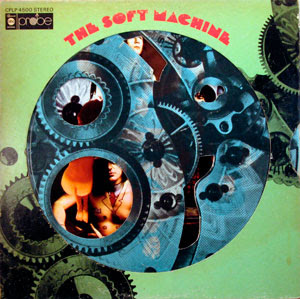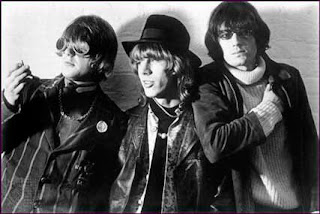
| Rola: | Save yourself |
|---|---|---|
| Traducción: | Salvate a ti mismo | |
| Intérprete: | Soft Machine | |
| Compositor: | Robert Wyatt | |
| Disco: | The Soft Machine | |
| Productor: | Chas Chandler, Tom Wilson | |
|
|
| Duración: | 02:26 |
| Año: | 1968 |
| Formato: | L.P. |
| A la venta: | 01/12/1968 |
| Disquera: | ABC Dunhill Records |
|
|
|
Mike Ratledge – órgano Lowrey Holiday De Luxe Kevin Ayers – bajo y coros |
|
|
|
|
|
|
|
Save yourself
|
Salvate a ti mismo
|
|
It's my, my bed you're lying on It's my, my bed you're dying on But if it's my head you're relying on You gotta save yourself Don't enslave yourself Just to save yourself Stay in your own bed at night Because, girl, you know that if I try to feed you and keep you all week to make you feel secure Then you won't leave my bed, though you wanna stay fed Will your heart remain, girl? You know you can't make it Without tryin' to fake it And I believe, baby You gotta save yourself Don't enslave yourself Just to save yourself Stay in your own bed at night |
|
|
|

LADO A 1. "Hope for Happiness" 2. "Joy of a Toy" 3. "Hope for Happiness (reprise)" 4. "Why Am I So Short?" 5. "So Boot If At All" 6. "A Certain Kind" |

LADO B 1. "Save Yourself" 2. "Priscilla" 3. "Lullabye Letter" 4. "We Did It Again" 5. "Plus Belle qu'une Poubelle" 6. "Why Are We Sleeping?" 7. "Box 25/4 Lid" |
|
The Soft Machine, as reissue also titled "Volume One", is the debut album by the British psychedelic rock band Soft Machine, one of the central bands in the Canterbury scene. The band, founded in 1966, recorded and released this studio album during their 1968 tour of the USA. It was produced by Chas Chandler and Tom Wilson. Recorded in just a few days in New York while Soft Machine were touring America, this debut album is really a reflection of the band's live sets at the time : a collection of psych-flavoured pop songs linked together by instrumental, sometimes improvised, interludes. Although the arrangements don't have the sophistication of later ones, what strikes one when listening to this album is how unique a style Soft Machine had already come up with at the time. Granted, there is some naivety in both the lyrics and music sometimes (some of the songs date from the Wilde Flowers years), but also an impressive maturity as a group of players. The interplay between Ratledge's organ and Wyatt's drums is of an intensity rarely paralleled in Soft Machine's later, more jazz-oriented efforts. Kevin Ayers' contributions are concentrated on the second side, the highlights of which are the absurdly repetitive "We Did It Again" and the Gurdjieff-inspired "Why Are We Sleeping?", both of which have since remained favourites of Ayers' solo gigs. |
|
|
 Soft Machine: Canterbury
Soft Machine: Canterbury
Soft Machine fue un grupo inglés de rock progresivo, rock psicodélico y jazz fusión formado en Canterbury en 1966. Su nombre proviene de la novela de William Burroughs The Soft Machine. Son una de las principales bandas de la Escena de Canterbury, la cual se caracterizaba por fusionar la psicodelia con el jazz y el rock progresivo. Soft Machine fue fundada en 1966 por el vocalista y batería Robert Wyatt, el guitarrista, bajista y vocalista Kevin Ayers, el guitarrista Daevid Allen y el teclista Mike Ratledge. Al poco de comenzar con su actividad, la banda grabó su primer single, Love Makes Sweet Music, y varias maquetas, que fueron publicadas algunos años después. Este material permitió que Soft Machine comenzase su primera gira por Europa, en países como Francia, Alemania y Holanda. De vuelta al Reino Unido, las autoridades de dicho país restringieron el acceso a Daevid Allen, australiano, por lo que éste regresó a París y fundó la banda Gong, y Soft Machine continuó como un trío. La grabación del primer álbum de la banda, The Soft Machine, transcurrió en los Estados Unidos dentro del género del rock psicodélico y rock progresivo. De vuelta al Reino Unido, Andy Summers, futuro guitarrista de The Police, se unió a la banda para participar en su gira, pero fue despedido al finalizar ésta a causa de problemas con Kevin Ayers. Después de una actuación en los Estados Unidos, Ayers decide disolver la banda, y sus miembros tomaron caminos distintos. Soft Machine was formed in 1966 by Robert Wyatt, Mike Ratledge, Kevin Ayers and Daevid Allen. Wyatt had already worked with Allen in the Daevid Allen Trio (which Ratledge occasionally jammed with) in 1963, and with Ayers in the Wilde Flowers in 1964. Although the band had its roots in Canterbury, it soon became a London-based band. In January 1967, the band's one and only single ever was recorded : it had two songs on it, "Loves Make Sweet Music" and "Feelin', Reelin', Squeelin'". Three months later, a collections of demos was recorded at DeLane Lea Studios with producer Giorgio Gomelsky, but not officially released until 1971 (on two compilations on the French Byg label). At that time, Soft Machine had already become something of a 'cult' band on the London psychedelic scene, gigging at places like the Roundhouse or the UFO. On April 29th, 1967, they took part in an event set up by the underground paper 'International Times', which also featured the Pink Floyd, and was given the name, '14 Hour Technicolor Dream'. During the summer, the band was involved in an avant-garde theatre project in St.Tropez, on the French Riviera, and it was on the way back that Daevid Allen was refused re-entry to England. So he stayed in France, moving on to various projects before forming Gong two years later, while Wyatt, Ratledge and Ayers decided to carry on as a trio. In February 1968, Soft Machine embarked on a 3-month US tour (opening for the Jimi Hendrix Experience), recording their first album in New York in four days in April, with production handled by Tom Wilson and Chas Chandler, former Animals bassist and Hendrix's producer. Although quickly made (most tracks are first takes) and not particularly well-recorded, "The Soft Machine" is now considered a classic of the extraordinarily creative post-psychedelic, pre-progressive, period of the late 60's... and quite rightly so! In May, a guitarist by the name of Andy Summers (also on the earlier Hendrix US tour, backing Eric Burdon… later in The Police, of course!) joined, for the second leg of the American tour (July-September), but left mid-tour. Disagreements on the musical direction began to arise between Ayers and Wyatt-Ratledge, leading to their parting company after the tour was completed. Wyatt stayed in Hollywood to work with Jimi Hendrix, while Ratledge and Ayers flew back to Europe. In December 1968, Wyatt was contacted by Probe, who had just released the first album, to discuss possible live dates by the band to promote it. With Ayers unavailable, Hugh Hopper was asked to join (he was about to sell his bass!), and after a month of rehearsal, the new line-up made its live debut at the Royal Albert Hall in February, a few days before entering Olympic Studios to record the second album. |
No hay comentarios:
Publicar un comentario
Nota: solo los miembros de este blog pueden publicar comentarios.